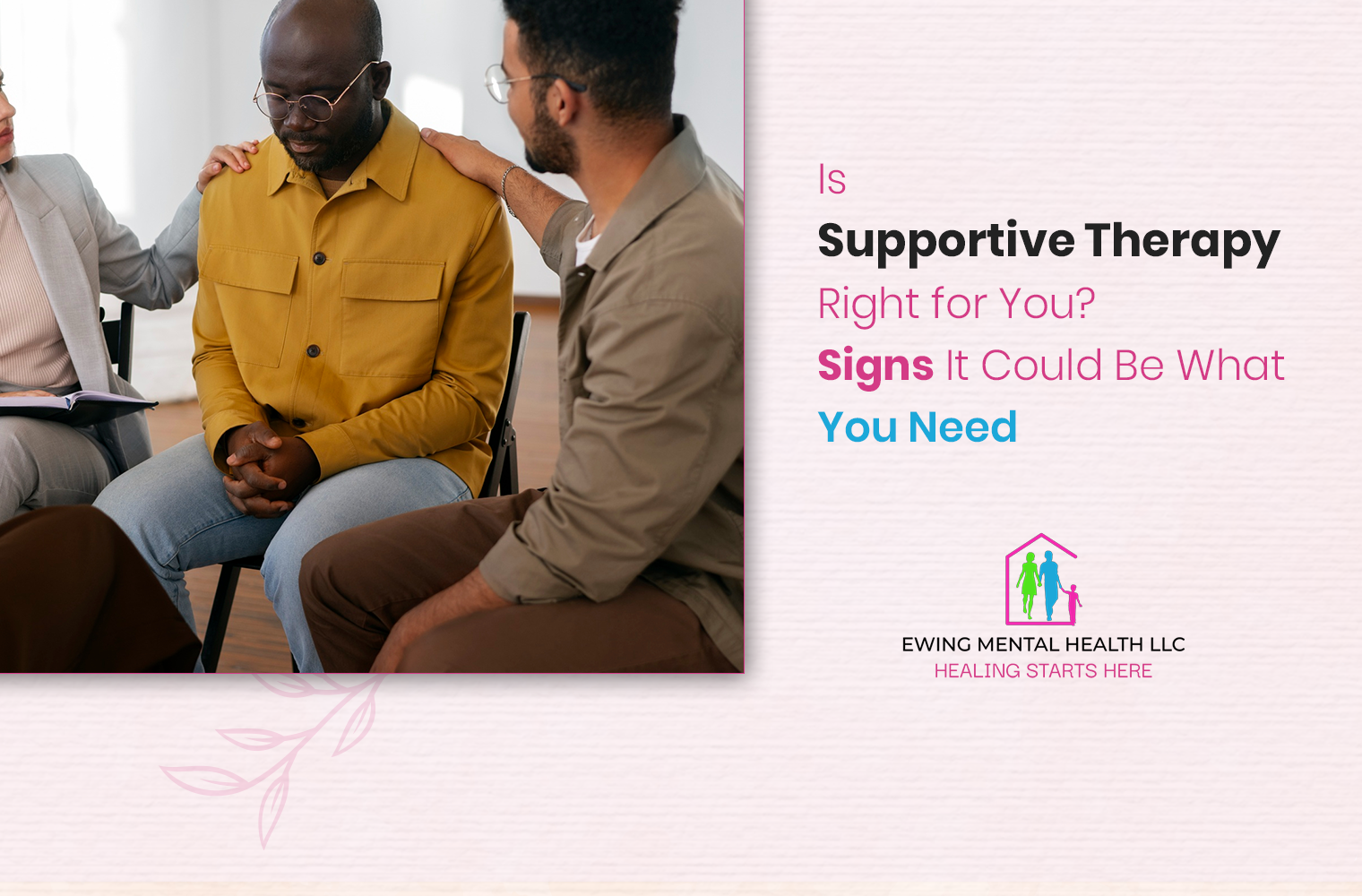Life can feel overwhelming. At Ewing Mental Health LLC, we know that everyone faces moments of sadness, worry, and uncertainty.
Sometimes, you might feel alone. No one gets what you’re experiencing. In these moments, supportive therapy can provide great comfort and healing.
But how will you know whether supportive therapy is right for you? Let’s explore the meaning of supportive therapy, how it can help, and how Ewing Mental Health can usher you through that door.
What Is Supportive Therapy?
Supportive therapy is a type of talk therapy. People feel better because they can talk openly, be understood, and receive support.
It focuses on your feelings rather than going back into your history. It aims to make you feel more powerful, secure, and encouraged daily.
A therapist hears you out, helps you handle your emotions, and gives strategies for tricky situations. You can get support, and it is offered without judgment.
At Ewing Mental Health LLC, our approach to supportive therapy is rooted in empathy, trust, and evidence-based care. No matter if you face anxiety, depression, or regular stress, we want to help you heal.
Signs Supportive Therapy Could Be Right for You
Trying to find out whether supportive therapy is what you need? Here are some signs that it may be a good fit.
- You Need Emotional Support During a Crisis
In a crisis, such as during the loss of a close friend, sudden illness, or loss of a job, supportive therapy provides a ground.
The therapists empathetically listen, validate without judgment, and encourage, which helps you become emotionally stable while moving through the immediate phase.
- You Feel Stuck for Some Reason
In some moments, the feeling of being drained or unmotivated comes without the knowledge of why. You may not have to dissect your entire history in supportive therapy.
Still, it can prop you up, validate your present experiences, and introduce practical coping methods to help you move forward.
- You Have Trouble Trusting or Opening Up
If you have trouble trusting other people or opening up emotionally. In that case, supportive therapy provides a safe and positive space where you can slowly feel more secure about sharing your emotions.
- You Need a Bridge Between Episodes or Treatments
Many individuals with chronic mental health conditions, such as bipolar disorder or schizophrenia, use supportive therapy as a bridge between intensive treatment episodes.
It helps maintain continuity, manage symptoms, and prevent relapse.
- You Desire a Non-Confrontational Therapy Approach
If you want to keep conflicts and large changes out of your life, supportive therapy is right for you because it helps you make use of your current resources.
You may prefer a gentle way if you don’t feel up to doing any serious inner work.
Who Can Benefit from Supportive Therapy?
Supportive therapy works well for anyone who needs guidance, especially those who are:
- Dealing with anxiety or stress
- Coping with grief or loss
- Facing a serious illness
- Going through a big life change (divorce, moving, job loss)
- Feeling low or unmotivated
- Struggling with self-esteem or confidence
Supportive therapy at Ewing Mental Health helps those seeking balance, connection, or clarity. You don’t need a clinical diagnosis to find value in it. If life feels heavy, we’re here for you.
What Happens During Supportive Therapy?
It begins with a casual, warm conversation. At Ewing Mental Health, we personalize care through a structured but flexible approach that starts with a comprehensive assessment and continues through weekly or as required therapy sessions.
Each session can involve:
- Talking freely about how you feel
- Identifying the concerns that are bothering you right now
- Defining small, manageable forward steps
- Strategies for dealing with emotional difficulties
We ensure a safe and accepting atmosphere. You’ll always be greeted with kindness and support.
What Makes Supportive Therapy Unique?
Supportive therapy is:
- Gentle and non-invasive
- Focused on the present, not just the past
- Rooted in empathy and validation
- Designed to help you cope, not overwhelm you
- Concentrate on enhancing your self-assurance and inner power
It’s not about adjusting who you are, it’s about encouraging you to feel okay being yourself again.
How Do You Know It’s Working?
You may begin to:
- Feel lighter emotionally
- Sleep better
- Handle stress more calmly
- Feel more hopeful about your future
Progress might be slow and gentle, but you will eventually feel more capable and balanced.
Final Thoughts
Feeling unsure about therapy is normal. It’s excellent to take the first step.
You are given a chance to talk about your thoughts and emotions in supportive therapy. You set the speed of your healing journey, and there is no pressure or judgment along the way.
At Ewing Mental Health, we’re ready to assist you when facing difficult moments. Our team adjusts our therapy services to meet your requirements.
Our support is available around the clock, we provide individualized treatment, and we use different types of experts to treat our patients. Contact us immediately at 609-439-4351 or by sending a referral now.
FAQs
Q: What conditions does supportive therapy treat?
Supportive therapy is effective for managing various conditions, including:
- Stress
- Anxiety
- Depression
- Chronic illness
- Grief
- Adjustment disorders
- And more
Q: Is it possible to do CBT and supportive therapy simultaneously?
Yes! They work very well together as long as they meet your expectations.
Q: Is supportive therapy prolonged or temporary?
It varies. Some people use it for months, others for years, based on personal needs.


